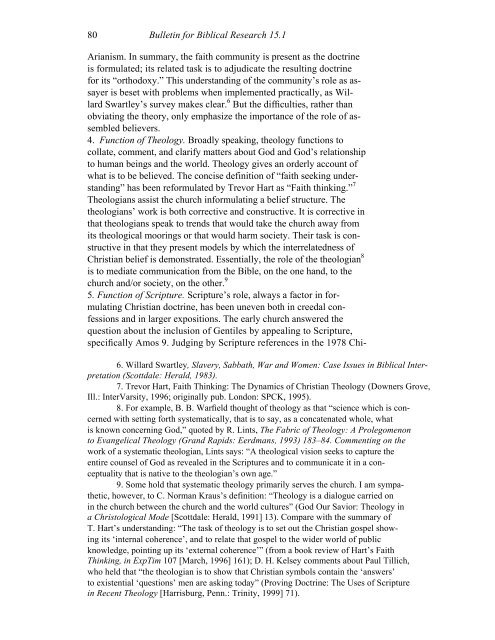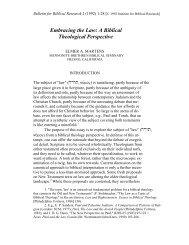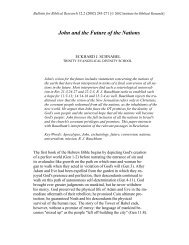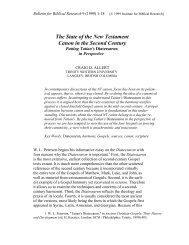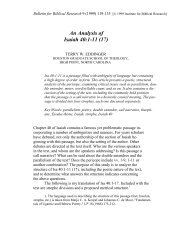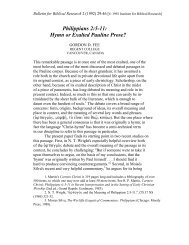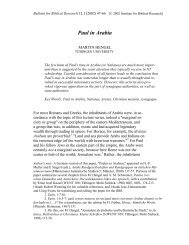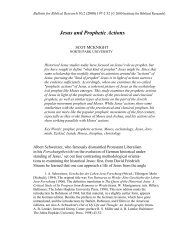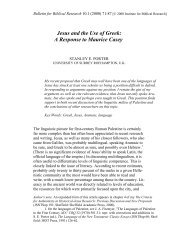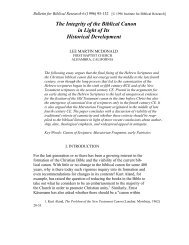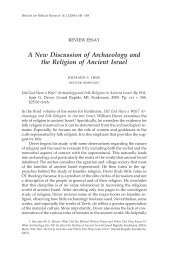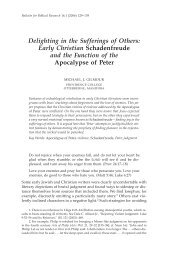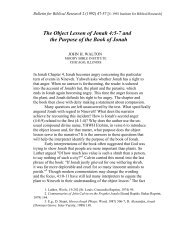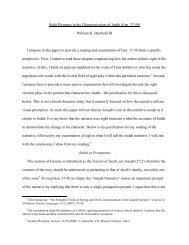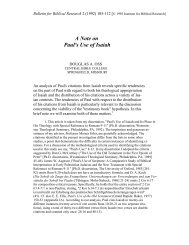Moving from Scripture to Doctrine - Institute for Biblical Research
Moving from Scripture to Doctrine - Institute for Biblical Research
Moving from Scripture to Doctrine - Institute for Biblical Research
You also want an ePaper? Increase the reach of your titles
YUMPU automatically turns print PDFs into web optimized ePapers that Google loves.
80 Bulletin <strong>for</strong> <strong>Biblical</strong> <strong>Research</strong> 15.1<br />
Arianism. In summary, the faith community is present as the doctrine<br />
is <strong>for</strong>mulated; its related task is <strong>to</strong> adjudicate the resulting doctrine<br />
<strong>for</strong> its “orthodoxy.” This understanding of the community’s role as assayer<br />
is beset with problems when implemented practically, as Willard<br />
Swartley’s survey makes clear. 6 But the difficulties, rather than<br />
obviating the theory, only emphasize the importance of the role of assembled<br />
believers.<br />
4. Function of Theology. Broadly speaking, theology functions <strong>to</strong><br />
collate, comment, and clarify matters about God and God’s relationship<br />
<strong>to</strong> human beings and the world. Theology gives an orderly account of<br />
what is <strong>to</strong> be believed. The concise definition of “faith seeking understanding”<br />
has been re<strong>for</strong>mulated by Trevor Hart as “Faith thinking.” 7<br />
Theologians assist the church in<strong>for</strong>mulating a belief structure. The<br />
theologians’ work is both corrective and constructive. It is corrective in<br />
that theologians speak <strong>to</strong> trends that would take the church away <strong>from</strong><br />
its theological moorings or that would harm society. Their task is constructive<br />
in that they present models by which the interrelatedness of<br />
Christian belief is demonstrated. Essentially, the role of the theologian 8<br />
is <strong>to</strong> mediate communication <strong>from</strong> the Bible, on the one hand, <strong>to</strong> the<br />
church and/or society, on the other. 9<br />
5. Function of <strong>Scripture</strong>. <strong>Scripture</strong>’s role, always a fac<strong>to</strong>r in <strong>for</strong>mulating<br />
Christian doctrine, has been uneven both in creedal confessions<br />
and in larger expositions. The early church answered the<br />
question about the inclusion of Gentiles by appealing <strong>to</strong> <strong>Scripture</strong>,<br />
specifically Amos 9. Judging by <strong>Scripture</strong> references in the 1978 Chi-<br />
6. Willard Swartley, Slavery, Sabbath, War and Women: Case Issues in <strong>Biblical</strong> Interpretation<br />
(Scottdale: Herald, 1983).<br />
7. Trevor Hart, Faith Thinking: The Dynamics of Christian Theology (Downers Grove,<br />
Ill.: InterVarsity, 1996; originally pub. London: SPCK, 1995).<br />
8. For example, B. B. Warfield thought of theology as that “science which is concerned<br />
with setting <strong>for</strong>th systematically, that is <strong>to</strong> say, as a concatenated whole, what<br />
is known concerning God,” quoted by R. Lints, The Fabric of Theology: A Prolegomenon<br />
<strong>to</strong> Evangelical Theology (Grand Rapids: Eerdmans, 1993) 183–84. Commenting on the<br />
work of a systematic theologian, Lints says: “A theological vision seeks <strong>to</strong> capture the<br />
entire counsel of God as revealed in the <strong>Scripture</strong>s and <strong>to</strong> communicate it in a conceptuality<br />
that is native <strong>to</strong> the theologian’s own age.”<br />
9. Some hold that systematic theology primarily serves the church. I am sympathetic,<br />
however, <strong>to</strong> C. Norman Kraus’s definition: “Theology is a dialogue carried on<br />
in the church between the church and the world cultures” (God Our Savior: Theology in<br />
a Chris<strong>to</strong>logical Mode [Scottdale: Herald, 1991] 13). Compare with the summary of<br />
T. Hart’s understanding: “The task of theology is <strong>to</strong> set out the Christian gospel showing<br />
its ‘internal coherence’, and <strong>to</strong> relate that gospel <strong>to</strong> the wider world of public<br />
knowledge, pointing up its ‘external coherence’” (<strong>from</strong> a book review of Hart’s Faith<br />
Thinking, in ExpTim 107 [March, 1996] 161); D. H. Kelsey comments about Paul Tillich,<br />
who held that “the theologian is <strong>to</strong> show that Christian symbols contain the ‘answers’<br />
<strong>to</strong> existential ‘questions’ men are asking <strong>to</strong>day” (Proving <strong>Doctrine</strong>: The Uses of <strong>Scripture</strong><br />
in Recent Theology [Harrisburg, Penn.: Trinity, 1999] 71).


